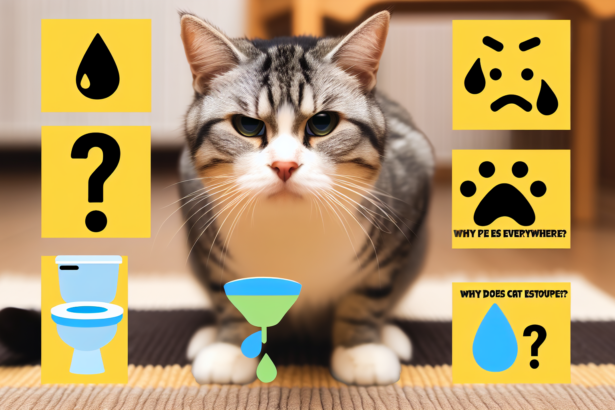Understanding why cats bite: deciphering their feline behavior
Understanding why cats bite is essential for all feline lovers, because behind those sharp little teeth often lie surprising reasons. Who hasn’t been caught off guard by an unexpected bite from their beloved cat? Let’s discover 5 surprising reasons for this puzzling behavior.
- Understanding why cats bite: deciphering their feline behavior
- The cat bite: a little-known means of communication
- Surprising reason no. 1: biting as proof of affection
- Surprising reason n°2: sensory overstimulation in cats
- Environmental bites: unexpected causes to be explored
- Surprising reason #3: Boredom, a frequent cause of bites
- Surprising reason n°4: physical pain or discomfort
- Surprising reason n°5: stress and anxiety in cats
- How to effectively prevent cat bites in everyday life
- Clear communication with your cat
- Providing an environment adapted to your cat’s needs
- Training your cat with gentleness and patience
- What to do in the event of a bite: essential steps to know
The cat bite: a little-known means of communication
Contrary to popular belief, biting is a genuine form of communication for our feline friends. But how can we decode this sometimes painful message?
- Identify the warning signs of an impending bite: flattened ears, wagging tail or dilated pupils are all signals to watch out for.
- Understand the different types of cat bites: affectionate bites, play bites or aggressive bites, each with its own meaning.
- How to react effectively to a cat bite: stay calm, avoid shouting and withdraw gently to avoid aggravating the situation.
Surprising reason no. 1: biting as proof of affection
Yes, you read that right! Your furball can nibble you for love. A puzzling gesture, but full of tenderness.
- Why does your cat bite you gently during cuddles? This behavior is reminiscent of the affectionate gestures kittens exchange with their mothers.
- Differentiating between affectionate and aggressive bites: affectionate bites are light, controlled and often accompanied by purring.
- Tips for managing affectionate nibbling without frustration: gently divert his attention to a suitable toy as soon as he starts nibbling.
Surprising reason n°2: sensory overstimulation in cats
Does your cat love to be petted, but suddenly bites you without warning? He’s probably over-stimulated.
- Recognize the signs of over-stimulation in your cat: tail wagging, skin twitching or ears flopping backwards indicate that it’s time to stop petting.
- How to avoid bites from prolonged petting: take regular breaks to let your cat relax.
- Simple techniques to calm an over-stimulated cat: offer him a quiet space or an interactive toy to divert his energy.
Environmental bites: unexpected causes to be explored
Surprising reason #3: Boredom, a frequent cause of bites
A bored cat is a cat that bites everything in sight, including your hands!
- Identify the typical behaviors of a bored cat: restlessness, destruction of objects or repeated biting.
- Stimulating activities to prevent boredom bites: interactive games, homemade obstacle courses or laser-hunting sessions.
- Practical tips for enriching your cat’s environment: discover how to create a play area with our dedicated article on how to create a play area for your cat.
Surprising reason n°4: physical pain or discomfort
An unusual bite can be a warning sign of hidden pain in your cat.
- How to detect if your cat is biting because of hidden pain: observe if he avoids certain positions or reacts strongly to touch.
- Common health problems that lead to biting: osteoarthritis, dental problems or skin infections.
- When to consult a vet about unusual bites: if in doubt, make an appointment for a full health check.
Surprising reason n°5: stress and anxiety in cats
Our little felines are sensitive to stress, and this can result in unexpected bites.
- Identify common sources of stress in domestic cats: moving house, arrival of a new pet or change of routine.
- Effective techniques to reduce your cat’s anxiety: soothing pheromone diffusers or regular play sessions.
- Create a soothing environment to prevent stress-related biting: provide comfortable, secure hiding places.
How to effectively prevent cat bites in everyday life
Clear communication with your cat
- Learn to decode his body language to anticipate his reactions.
- Set clear limits from an early age.
- Positively reinforce desired behaviors with rewards.
Providing an environment adapted to your cat’s needs
- Create a stimulating space with toys adapted to your child’s preferences.
- Choose a variety of accessories to satisfy its natural instincts.
- Create a reassuring territory where he can take refuge in case of stress.
Training your cat with gentleness and patience
- Use positive methods to correct undesirable behavior.
- Common mistake to avoid: never physically punish your cat after a bite, as this will only aggravate his stress and distrust.
- Be consistent in your reactions to help her learn.
What to do in the event of a bite: essential steps to know
First aid after a cat bite
- Clean the wound immediately with soapy water.
- Consult a doctor if the bite is deep or shows signs of infection (redness, swelling).
- According to a Mayo Clinic study, cat bites can lead to serious infections, so never neglect them(source).
Analyze the circumstances of the bite to better understand your cat
- Clearly identify triggers to avoid recurrences.
- Adapt your behavior accordingly.
- Stay objective to better understand your companion.
When should you seek help from a feline behavior professional?
- If bites become frequent or violent, consult a specialist.
- Choose an experienced and recommended feline behaviorist.
- A professional consultation will help you regain a harmonious relationship.
Understanding why cats bite is the key to strengthening your bond with your beloved furball. Feel free to explore our articles on Pawtounes.fr to become a true expert in feline behavior!






